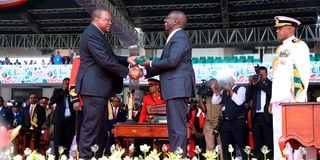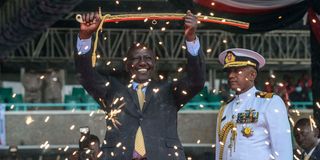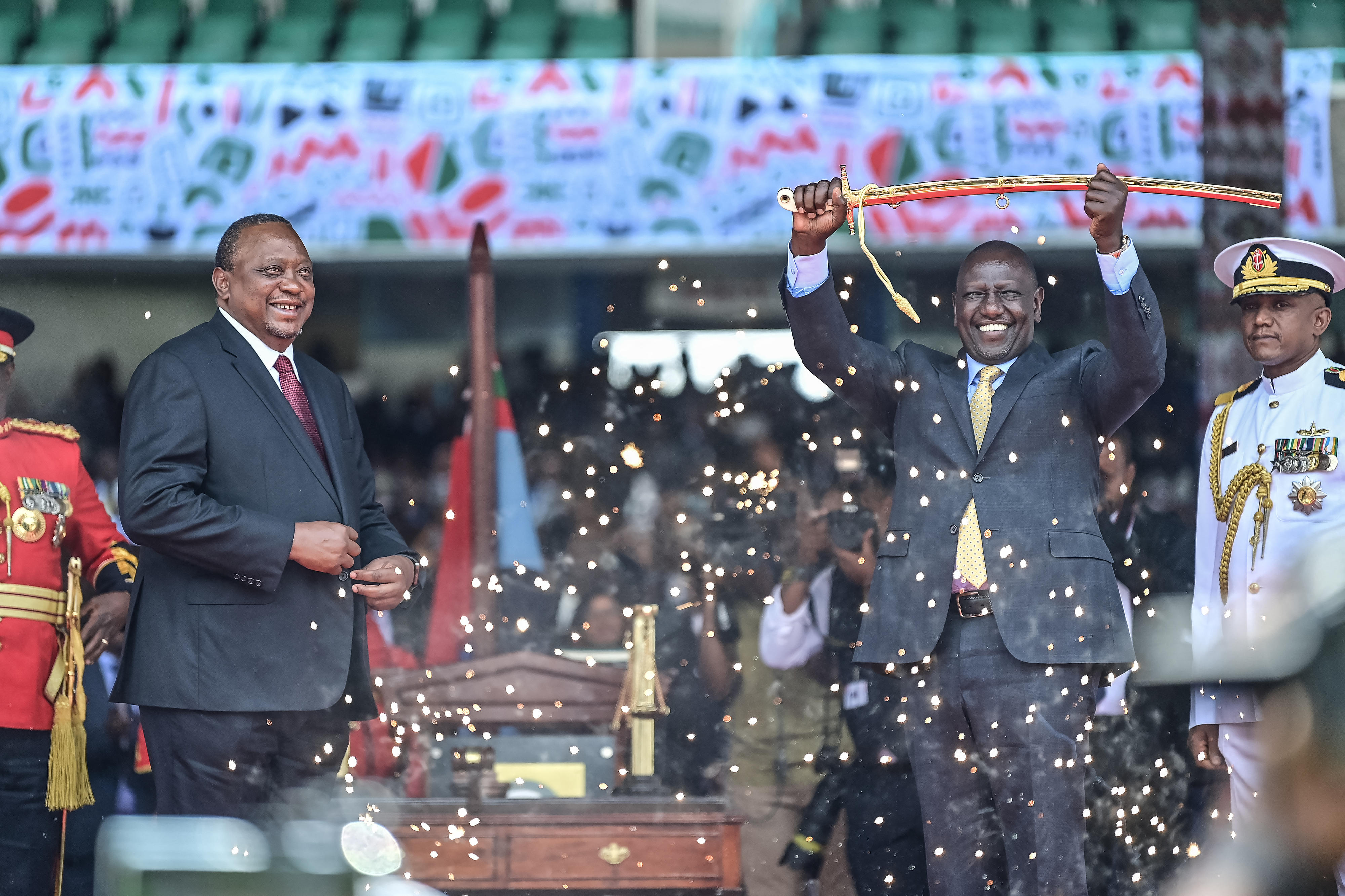
President William Ruto is handed the instruments of power by his predecessor Uhuru Kenyatta after he took the oath of office at the Kasarani International Stadium on September 13, 2022.
Alleged behind-the-scenes frustrations and sabotage during the transition of power to President William Ruto from his predecessor Uhuru Kenyatta are at the heart of a Bill seeking to radically alter the composition of the assumption of the Office of President team.
The National Government Administration Laws (Amendment) Bill, 2023 currently in Parliament seeks to amend the assumption of Office of the President Act, 2012 (No. 21 of 2012) by doubling the number of representatives of the President-elect from the current three to six.
Kenya Kwanza alliance seeks to hand more influence to the President-elect in the running of affairs of transition and to prevent any form of sabotage in instances where the incoming Head of State does not enjoy the backing of the outgoing leader.
Interviews with President Ruto’s representatives in the transition team have revealed instances of sabotage of logistics by some of the senior officials in Mr Kenyatta’s administration, including refusal to dispatch guest invitation cards for the inauguration.

President William Ruto lifts a sword at the Moi International Sports Center Kasarani in Nairobi, Kenya, on September 13, 2022 during the inauguration ceremony.
Allies of President Ruto told the Sunday Nation that the current team is heavy with government officials, a scenario they say can be exploited to cripple handover of power.
A majority of the members of the team that was chaired by then Head of Public Service Joseph Kinyua were government officials, who had publicly opposed Dr Ruto’s candidature, including members of the National Security Advisory Committee (NSAC) who allegedly tried to overturn his victory.
Mr Kenyatta backed Azimio La Umoja One Kenya Coalition leader Raila Odinga for the top seat following a bitter falling-out with Dr Ruto – his then deputy.
President Ruto had Justin Muturi (now Attorney General), nominated Senator Veronica Maina, his then Chief of Staff Davis Chirchir (now Energy Cabinet Secretary) and Uasin Gishu Woman Rep Gladys Shollei.
Government officials in the team include the Head of Public Service, who is also the chair, Attorney General, Chief of Defence Forces, Inspector General of Police, Interior Cabinet Secretary, Interior Principal Secretary and Foreign Affairs Principal Secretary.
Others are National Intelligence Service Director General, Judiciary’s Chief Registrar, State House Comptroller, Solicitor General, ICT Principal Secretary and Treasury Principal Secretary.
The Bill sponsored by National Assembly Majority Leader Kimani Ichung’wah aims to amend the Assumption of the Office of President Act by strengthening its composition ‘by incorporating the Secretary to the National Security Council and the principal secretary responsible for Defence as additional members of the committee.’
“Additionally, the Bill also seeks to enhance the representation of the President-elect in the Committee by increasing the number of representatives from three to six,” states the Bill.
Mr Muturi cited instances where they made decisions as a team, only to be frustrated by government officials mandated to execute them.

Outgoing Kenya President Uhuru Kenyatta looks on as President William Ruto lifts a sword at the Moi International Sports Center Kasarani in Nairobi, Kenya, on September 13, 2022 during the inauguration ceremony.
“You realise the committee as constituted currently is heavy with those in office. In essence, they can frustrate the incoming President in terms of logistics,” said Mr Muturi, who represented Dr Ruto in the team.
“You make decisions as a team but those in office are not ready and committed to implementing them. Some of the people in the team had taken strong positions and were not willing to facilitate smooth transfer. I think this proposal is good to ensure ample representation of the President-elect,” he told the Sunday Nation.
“Those of us who represented Ruto as President-elect got frustrated during the transition period. You agree on simple things like sending out invitation cards, but people sitting at Harambee House decide to sit on them,” he revealed.
He disclosed plans to add “more meat” in the Bill to hand more power and influence to representatives of the President-elect so that they can make decisions and proceed to implement them without much reference to officials in the outgoing administration.
Cold blood
He said there was cold blood among members of the team since “a number of officials in the team were members of the National Security Advisory Committee, who had tried some shenanigans at Bomas of Kenya.”
Mr Kenyatta had in his address – after the Supreme Court affirmed Dr Ruto’s win – vowed to oversee a smooth transition.
“The process of handing over is in progress through the Assumption of Office Committee which had actually begun its work as of August 10, 2022. Indeed, it is my intention to oversee a smooth transition to the next administration and all the necessary orders to facilitate this process have already been issued,” Mr Kenyatta said on September 5.
Ms Maina, who was also part of the transition team, said the current composition is prone to sabotage. She says officials of the outgoing team may cripple the process by not attending the planning meetings.
“It is a good amendment because when we sat in the last team, representatives of the President-elect were few,” said Ms Maina.
She added: “It seeks to cure the level of representation. There is a way that the committee can be crippled when the incoming President does not enjoy the backing of the outgoing president. It is an amendment in good faith.”
Kimilili MP Didmus Barasa and his Nyaribari Chache counterpart Zaheer Jhanda said the President-elect should have majority members in the team.
Punishment
The two said they will introduce amendments to the Bill to make it punishable for any government official in the team to deliberately snub its meeting.
“The President-elect should be superior in the transition team. Why would the outgoing President want to control the handing over by populating the team with his men and women? This proposed amendment will cure situations where the outgoing Head of State has intention to frustrate smooth handover of power,” said Mr Barasa.
“If you saw what happened in the last transition, it would be in the interest of this country to have a transition team that is President-elect heavy. Personally, I will introduce amendments to ensure those sitting in the team are punished if they refuse to attend such meetings because of political differences with the President-elect,” he added.
Mr Jhanda said the Bill is meant to ensure that whoever would be elected in future does not experience the same problems that Ruto experienced because of his falling-out with the former leader.
The mandate of the assumption of office team includes facilitating the handing over process by the outgoing President to the President-elect, organising for the security of the incoming leader and organising for their necessary facilities and personnel, besides coordinating the briefings by the relevant public officers, among other roles.









